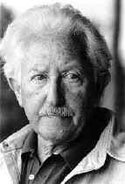
See
Friedman (1999). Identity's Architect....
Psycho-history of the psycho-historian.
Father & Mother figures, making one's place in history, configurational:
inner & outer, culture and psyche,...
 |
Erik Homberger Erikson (1902-1994): Hermeneutics of Identity
See
Friedman (1999). Identity's Architect.... |
Born in
Karlsruhe Germany to Karla Abrahamsen
(Salomonsen).
Adopted by Theordore Homberger and raised as a German,
yet spent his life searching for his mythical Danish father.
As a young man
was caught between worlds, neither German, nor Jew.
Never really fit in.
Influenced by the
concept of Bildung where he developed as a
person
and as an academic throughout his whole life from Wanderschaft to
wandering back and forth across America.
Kierkegaard---
1927 -33 Vienna
Drew heavily from the developmental model of Freud, yet was
critical of his "backward" and "downward"
looking "fatalism" of this "mythical father".
Studied under Anna Freud (not HIM) after being an artist and teacher for
Dorothy Burlingham's Heitzing school with his
Montessori diploma.
Met Joan Serson, who led him away from the Freuds to America and a new identity.
Lamented August
Aichorn not being his mentor, rejected by this substitute father.
Felt betrayal, doubt & distancing.
Voted a full member of the Vienna Psychoanalytical Society (had hoped for associate membership) as well as the International Psycho-Analytical Association.
33-39 Harvard & Yale- Boston's first Child psychoanalyst & influenced by Edward Sapir: description.
Configurational approach indicates that our inner
and outer realities reflect each other.
See in the play strategies of children: Boys vs. Girls. Influenced by Henry
Murray's TAT
cultural expressions
uc berkeley
Ego-Development and Historical Change - championed the orientation of psycho-history of Mahatma Gandhi, Martin Luther, Thomas Jefferson & William James, following the lead of R.G.Collingwood
This is a manifestation of the configuration inner-outer development of ego-identity, subjective personhood and objective society.
Consulted at the Menniger Clinic in Topeka Kansas, came to develop close relationship with David Rappaport.
Worked with Sioux and Yurok on identity crisis
1950 Childhood and Society -
1960s ~ Cultural Hero:
Return to Harvard
Gandhi's Truth - Satyagraha - "perseverance in truth"
Psuedo-speciation - drawn from Conrad Lorenz, the denial that humankind is "obviously one species" but rather to make arbitrary and imposed classifications on groups of people.
the importance of the epigenetic principle: "in each stage of life given strength is added to a widening ensemble and reintegrated at each later stage in order to play its part in a full cycle-if and where fate and society permit." (Erikson, cited in Freedman, 1998, . 377).
Influenced heavily by Margaret Mead - in developing an anthropology of identity.
Explicitly recognized the historical situatedness of the therapist and the "client" in the clinical model for understanding humans
The clinical method makes use of "disciplined subjectivity" for both (all) persons involved where "the two subjectivities join in the kind of disciplined understanding and shared insight which we think are operative in a cure"
Therapy involves the emancipation of a patient (meaning passive) into an agent
Ontologically, humans are comprised of three principle
processes of organization or spheres of being: Soma, psyche & ethos
(polis)
Mutuality:
psycho-social being where persons are engaged in the "inter-living" or
interdependent "cogwheeling" of the life-cycles
of each other
Along with his wife Joan, drawing from Shakespeare's "As you like it" they develop:
The "Life Cycle" is comprised by eight "age-specific" turning points or "crises" of normative development.
All stages are active for each person at all ages, although they emerge as being important through epigenesis
Each stage has a
dialectic to be confronted between
a ritualization (thesis)
and a ritualism (antithesis)
which when resolved leads the emergence of a virtue
(synthesis)
Trust
vs. Mistrust -> HOPE
Autonomy vs. Shame or Doubt -> WILL
Intitiative vs. Guilt -> PURPOSE
Industry vs Inferiority -> COMPETENCE
Identity vs. Role Confusion -> FIDELITYY
Intimacy vs. Isolation -> LOVE
Generativity vs. Stagnation -> CARE
Integrity vs. Despair -> WISDOM
Identity formation involves the acceptance of ideologies and values for organizing one's life, finding one's mythology.
It involves the biological, psychological and social worlds where a sense of "being at one with oneself" and "a sense of affinity with a community's sense of being at one with its future as well as its history"
Erik Erikson was a self-made man, " If the relation of the father and son dominated the last century, then this one is concerned with the self-made man asking him-self what he is making of himself " (1964, cited in Freedman, 1999).
Major Books and important works:
1950 - Childhood and Society
1958 - Young man Luther
1964 - Insight and Responsibility
1968 - Identity, Youth and Crisis
1969 - Gandhi's Truth
1970 - Autobiographical Notes on the Identity Crisis
1974 - Dimensions of a New Identity
1982 - The Life Cycle Completed
